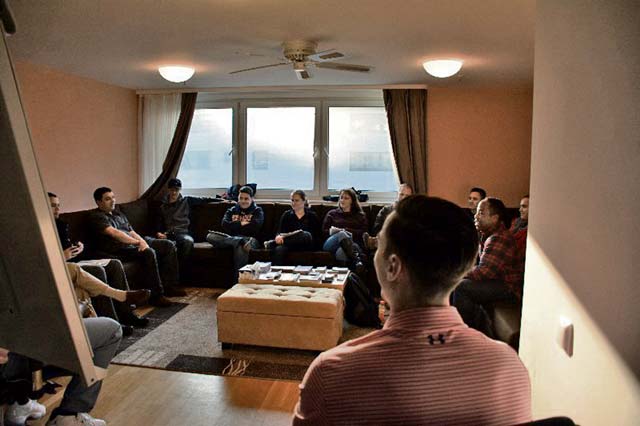
Tackling how to normalize and strengthen resiliency for Airmen who never leave the battlefield because they may be involved in operations during the day and go home to see their daughter’s ballet recital is a striking paradigm.
Deployed-in-place Airmen working in the intelligence community encounter these unique stressors that demand solid resiliency habits and rituals to maintain peak performance levels across the course of their careers.
The 450th Intelligence Squadron, in partnership with the 693rd Intelligence, Surveillance, Reconnaissance Group’s Airmen Resiliency Team, host a monthly Warbird Resiliency Week at Ramstein. This program provides a venue for deployed-in-place Airmen to collectively discuss how they deal with the stressors of having such a lifestyle and offer a normalized, phased resiliency period for every squadron member.
“No one questions the importance of routine preventative maintenance on a privately owned vehicle, or phased maintenance for aircraft. Things and people tend to break down over time in the absence of regular maintenance,” said Maj. Reed Reichwald, 693 ISRG director of operational psychology. “Motivation to maintain all the healthy habits we know that we should sometimes give way to the pressures of our lives and jobs.”
Resiliency week is a four-day prevention program targeted to all Airmen of the 693 ISRG. It’s comprised of lessons such as whole person wellness, relaxation training and mission nutrition; along with team building activities like blind puzzles, yoga and hikes.
“I personally enjoyed the relaxation discussions the most,” said Tech Sgt. Heather, 450 IS, who participated in resiliency week. “I have a hard time transitioning from a work-to-home mentality on a daily basis; a lot of stressors and frustrations from the day stick with me throughout the night. It was extremely beneficial to be able to discuss similar relaxation issues with other members of our squadron and we were offered a lot of practical and tailored suggestions to help us improve. I’ve since applied quite a few of those suggestions and it really has made a difference.”
Resiliency Week borrowed from the model used by the Deployment Transition Center for the traditional downrange redeployer and combined that with Comprehensive Airmen Fitness pillars used by the Airmen Resiliency Team for deployed-in-place Airmen.
“Programs like the resiliency week are perhaps a natural outgrowth of (former 480 ISR Wing commander) Brig. Gen. Jeff Kruse’s decision to embed Airmen Resiliency Teams comprised of medical, mental, health, and religious support assets at key locations across the enterprise,” added Reichwald. “Forward-leaning leaders across the Wing have leveraged ART resources in a variety of ways to ensure that their Airmen are being taken care of, and learning the skills they need to maintain peak performance in a very demanding, high-ops tempo environment. Resiliency week is just one instance of commanders’ efforts along these lines.”
Occupational health research from the Remote Pilot Aircraft / Distributed Common Grounds System communities suggested the need for a variety of interventions to improve the health, well-being, and quality of life for deployed-in-place Airmen.
“While we do not face the difficulties inherent to a deployment in austere locations; DCGS Airmen and other teams in the 480 ISRW face difficulties that have stressful impacts due to our mission,” said Capt. John, 450 IS, who participated in the resiliency week. “Resiliency week presents a prime opportunity for decompression and morale improvement while simultaneously imparting information that may be new to first term Airmen and re-enforcing key tools and resources to supervisors.”
Initial feedback from the resiliency week attendees has been very favorable and with each iteration of the class they’ve received valuable feedback from their operators who are investing in making the program better for their colleagues and community.
“The main take away from resiliency week for me, as an officer, was that giving resources to my Airmen and proactively fostering an environment where each member of the team understands how to deal with a lifestyle such as the one Distributed Ground System Airmen face is a key responsibility of leadership,” said John. “In addition to giving them the resources and contacts to address issues such as difficulty sleeping, healthy dieting, and other resiliency methods; I have the responsibility to ensure they understand that seeking assistance is not a sign of weakness.”
The first expanded Resiliency Week will begin in April 2017. This course will run two concurrent courses, one for the 450 IS and one for the 24 IS. This expansion is the first step in scaling the program for broader resiliency across the 693 ISRG.
Resiliency week at DGS-4 is made possible, in part, due to the partnership with the DTC, which is committed to serving deployed-in-place Airmen and helping the Air Force community understand the unique demands placed on Airmen as the way we fight our nation’s wars continues to evolve.
“The human weapon system is the Air Force’s most extraordinary asset, and it requires routine preventative maintenance in order to maintain peak performance over time,” said Reichwald. “Our Airmen’s efforts along these lines will not only optimize their performance at work, but at home, and in their relationships, and it will help them to find purpose and drive them toward achieving their goals in all aspects of their lives.”

Airmen from the 450 IS participate in group discussions during Warbird Resiliency Week on Ramstein. This program provides a venue for deployed-in-place Airmen to collectively discuss how they deal with the stressors of having such a lifestyle and offer a normalized, phased resiliency period for every squadron member.— Courtesy Photo


